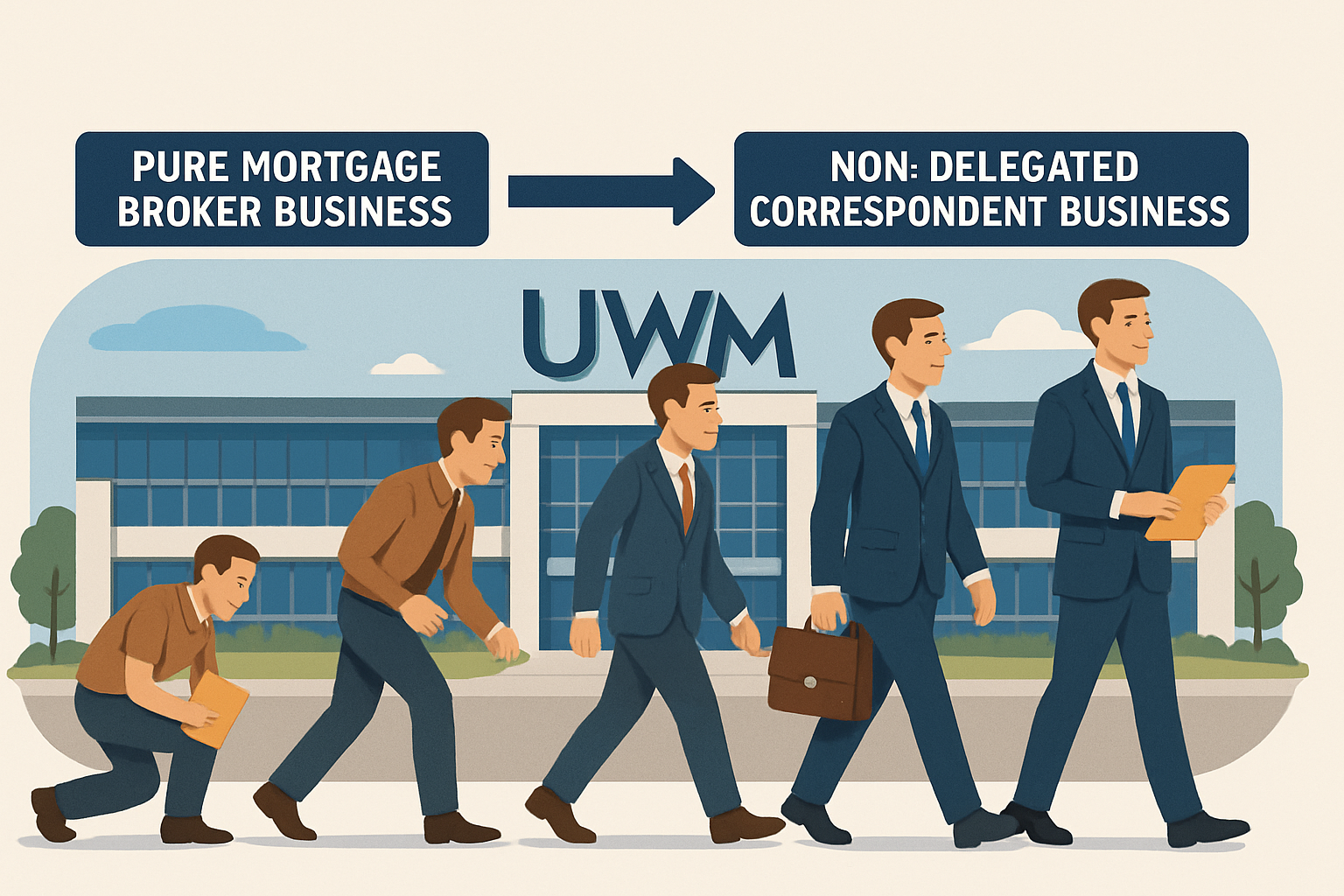Trigger Leads Are Dead. Long Live Trigger Leads

Trigger leads are changin’
Joe Shalaby buys 5,000 trigger leads a day from the credit reporting bureaus. But even as the govt. moves to kill nearly all of them, he isn’t sweating it.
It’s because he doesn’t think they’re really going away. Not exactly.
“It’s a rebrand that’s happening,” Shalaby, principal at E Mortgage Capital, told The Scoop. “They’re going to be opt-in leads, they’re going to skyrocket in cost, and they’re going to be a better lead, really.” Lead quality will improve, he believes, because LOs will warn clients to opt out. The ones that choose to ignore that advice and see what’s out there will be warmer leads.
“We don’t know what the consumer response is going to be yet,” Shalaby added. “Everyone’s just on the sidelines waiting.”
What’s On Tap – Aug. 27
Trigger leads (Cont.)
Industry pros expect that by early Sept., President Trump will sign the bill, which would outlaw most trigger leads effective March ‘26 (servicers and the original lender have carve-outs). The trade groups all pushed for an end to the lists, which typically result in scores of calls and texts from consumer direct lenders and brokers who buy them in bulk for pennies. Companies buy both hard pulls and predictive triggers (which sources said are sometimes mistaken for soft pulls).
Trigger-lead shops say they’re delivering a far better rate to the borrower because they go Ozempic-skinny on comp. Isn’t a day of being pestered worth the savings?
“All the big guys that talk down on trigger leads are still buying them themselves,” said Will Donovan, director of lender network growth at Own Up. He added that brokers, often Rocket alums, are heavy buyers on refi triggers. “They’ll be in the deepest trouble,” he said. “The credit bureaus are introducing them to us for relationship purposes.”
As lead gen goes, trigger leads are the dregs, converting at ≈ 0.5%. Industry pros said that even though Transunion’s ‘21 acquisition of Neustar made it the best product in the space, it’s still ”all garbage.”
“It’s how you enrich them [that matters],” Shalaby said.
It’s unclear how the bureaus would execute on this rumored “opt-in” strategy; Experian is easily the biggest player in the space and has the most to lose. Several sources speculated that its more likely to happen at the aggregator level, with companies “sneaking something into disclosures.” One thing everyone agrees on is that the number of trad trigger leads will plummet to near-zero. The bureaus could, however, move to create mortgage marketplaces. So-called “opt-in” leads would likely cost hundreds of dollars a pop, giving an edge to deeper-pocketed consumer direct players and a few broker shops.
As it is, the industry’s moving toward other lead gen types. “Where we see the world going and what Cotality specifically is targeting is relationship-based leads,” said Praveen Chandramohan, who oversees mortgage originations at the tech firm. If a lender or brokerage has an existing r’ship with a borrower, they are eligible to use MLS listing triggers as a strategy to retain their customer. “Mobile devices visiting homes listed for sale are an indicator of shopping intent and we are able to alert lenders when their customers are likely in the market,” Chandramohan said. “It’s pretty affordable,” he added.
There is also propensity modeling, trying to predict how likely a homeowner is to refi, purchase or take a home equity loan. From there, it’s old-school mailers and flyers or emails and social.
Leads are also coming from title companies and they’re heavily targeting FHA/VA refis, sources said.
Others will migrate to SEO players like LendingTree, Nerdwallet and Zillow. But that can also get dicey.
“I have agent partners who are sending more of their pipeline to Zillow because they have to hit a quota through Flex,” quipped one LO. “So that sucks now too.”
How A Regulator Was Put Down 🐶

Russell Vought at the CFPB headquarters
More than a week after Donald Trump’s inauguration, CFPB workers marveled that Director Rohit Chopra still had a job. A protege of Elizabeth Warren, Chopra had been busy since Election Day, too. Very busy.
Chopra had issued a dizzying number of directives and new pro-consumer initiatives that—even by his standards—tested the legal limits of the agency’s power. Many interpreted it as Chopra giving state regulators a roadmap to follow after he was inevitably fired. The axe 🪓 fell on Feb. 1 and mild-mannered Treasury Secretary Scott Bessent took over. Agency staff were relieved. But Project 2025 architect Russell Vought was soon named Acting Director. Then DOGE entered the building.
Vought and Mark Paoletta, the agency’s chief legal officer, allegedly used a confrontation between an agency worker with a baby stroller and DOGE staff as a pretext to shut the building down for safety reasons, sources said. Since then, it’s been WFH and waiting for the courts to decide the agency’s fate. (The union recently lost a key court battle.) Many staffers blame Chopra for the pendulum swinging so far right that the agency is now on the verge of extinction (or, as they described it , “Five guys and a phone” 📲).
“Rohit overplayed his hand with political appointees,” one said. “We blame Rohit for this reaction,” said another. “If you hadn’t gone off the fucking deep end, you wouldn’t have put us in [front of] the firing squad.”
DOGE contract cancellations, reductions in force (RIF) and early retirements have resulted in essentially no supervisory work and limited enforcement, particularly in mortgage. Supervisory staff are closing out old files and there are no new exams starting. While the HMDA data this year has been fine, there are concerns about what happens in the future. Among the few items still in the agency’s purview is a potential reworking on LO Comp and servicing rules under Reg Z and Reg X.
“All of them are extremely deregulatory, so I don’t feel like they have the staff to fine-tune and surgically attack these rules,” said one source.
In essence, sources told The Scoop, they’re testing what a wholesale gutting of the regulations would look like. But that doesn’t quite work with rules such as LO Comp because removing discretion would create ugly real-world scenarios.
“If you went to a literal interpretation, if a broker gets paid by a lender, he can’t charge any points,” one source said. “It’s a big deal.” A different source said that OMB had already concluded they can’t really do away with the LO Comp Rule, and all of these discussions have been tabled ‘til the spring 🌸
Rising Defaults Test Even the Strongest Stomachs
EPM head honcho Eddy Perez has received calls asking if he’s going out of business because his HUD/Ginnie tickets have been pulled. He’s not, and they haven’t. Perez is, however, suspending FHA originations in 3 areas with elevated compare ratios, The Scoop has learned.
“All we did was self-select 3 areas where the compares were elevated in [terms of] defaults,” Perez said. “It’s roughly about 30-40 units a month so it’s not even that big of a hit. It’s just those areas had much elevated areas for different reasons. Because defaults were higher, we thought it was probably safer to pull those at this time, to suspend them.” The originations will be suspended for a 90-day period and then re-evaluated for another 90 days. One of the areas is Central Florida 🐊 , where he said the surge in taxes and insurance resulted in more defaults. EPM has a reputation for working hairier loans, and Perez said he’s working with the subservicer in those areas on loss mit and is otherwise totally open for business.
Quickies
-
UWM’s “Refi 90” special promo is real, no 🚬 . One top broker said that with 101 pricing on VA IRRLs, UWM is at 5.5 and six lenders are at 5.625 “and I haven’t even heard of four of them.” He’s already racked up a ton of rate-terms. The program runs through Sept. 16 (Fed Day).
-
Pulte has given Rocket Companies his blessing to buy Mr. Cooper for $9.4B, with one caveat: Their servicing GSE business is capped at 20%. Mr. Cooper and Rocket combine for roughly about 13% of the GSE-owned servicing market, per KBW. With subservicing, it’s closer to 20%. Does that count? It’s not clear. More TK on Friday. 🚀
-
5Y later, JPMC has brought back HELOCs. But customers will need to tap 85% of the total line upon opening the account. Loan amounts are between $25,000 and $400,000 with a maximum CLTV of 80%. Origination fees can be up to 4.99% of the total limit. Better deals can likely be found elsewhere…
-
FHA is getting on board with the big GSE appraisal changes. FHA will adopt UAD 3.6 beginning in early spring ‘26. It means a lot of streamlining, with a new format that “mirrors the LE, CD and 1003 style,” said Jemma Pachiano.
ARMchair Critics
🙏 If you like what you’re reading, tell a fellow mortgage junkie to sign up here.







